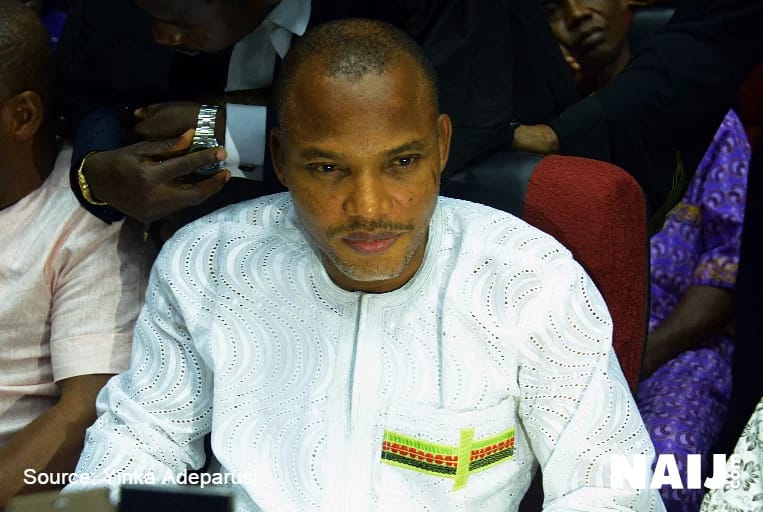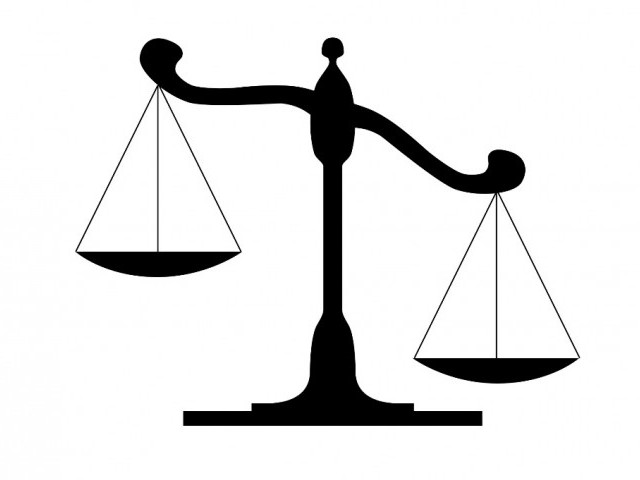Biafra: Court Revokes Kanu’s Bail, Issues Bench Warrant For His Arrest
The Federal High Court sitting in Abuja, on Thursday, issued a bench warrant for arrest of the leader of the proscribed Indigenous People of Biafra, IPOB, Nnamdi Kanu.
The court, in a ruling by trial Justice Binta Nyako, equally revoked the bail it earlier granted to the IPOB leader who is facing treasonable felony charge.
Placing reliance on section 352(4) of the Administration of Criminal Justice Act, ACJA, 2015, the court, said it would go ahead to try Kanu in absentia. Justice Nyako said the order was informed by the inability of Kanu’s lawyer, Mr. Ifeanyi Ejiofor, to give “cogent, compelling and verifiable reason” why his client repeatedly failed to appear in court to answer to the charge the Federal Government preferred against him.
The court subsequently fixed June 18 to commence Kanu’s trial in his absence.
The ruling followed an application FG made on Wednesday after Kanu’s case was called up for trial.
Kanu, whose whereabouts has remained unknown since September 2017, was hitherto answering to a five-count charge FG entered against him and three other pro-Biafra agitators, Chidiebere Onwudiwe, Benjamin Madubugwu and David Nwawuisi.
Shortly after the IPOB leader was declared “missing”, trial Justice Nyako, on February 20, 2018, okayed separate trial for the other three defendants.
Kanu, who has dual citizenship, had since been reportedly sighted at various locations outside the country, including Jerusalem and the United Kingdom.
FG’s lawyer, Mr. M. S. Labaran, had at the resumed proceeding, persuaded the court to revoke the bail it granted to the defendant on April 25, 2016.
Labaran drew attention of the court to the fact that all the three persons that stood surety for the IPOB leader, had since applied to withdraw from the matter.
“We humbly submit that the defendant has been given adequate opportunity in line with Section 352(4) of the ACJA.
“When he failed to utilize such opportunity, the court took the appropriate step of initiating proceeding requiring the sureties to show cause.
“Even at that, this court has been so magnanimous in granting several adjournments, giving the sureties the opportunity to show cause. “Consequent upon which the court delivered a ruling on November 14, 2018, for the sureties to forfeit their bail bond.
A matter that is currently the subject of appeal.
“It is on record that even the sureties have applied to withdraw because they cannot explain the whereabouts of the defendant.
“It is our submission that the request by counsel to the defendant is rather belated. This is the kind of application that he ought to have brought when the court after granting the defendant bail, adjourned for nearly 12 months.
“We urge the court to discountenance the request for adjournment to give any explanation, and order that the bail be revoked, and issue a bench warrant against the defendant.
Finally, we urge the court to issue an order for trial of the defendant in absentia, in compliance with relevant portions of the law”.
Kanu’s lawyer, Mr. Ejiofor, had earlier made frantic efforts to convince the court to grant a short adjournment to enable him to file affidavit evidence to explain reasons behind the defendant’s disappearance, was refused.
Ejiofor had insisted that Kanu’s disappearances was occasioned by the unwarranted invasion of his home by the Nigerian Army.
He was however overruled by the trial Judge who traced the history of the case and Kanu’s repeated failure to make himself available for trial since he was released on bail.
“I am of the opinion that learned counsel is only seeking for time to delay the inevitable” Justice Nyako held. The court had on April 25, 2016, released Kanu on bail on health ground after he had spent a year and seven months in detention.
To secure Kanu’s release, Abaribe, Uchendu and a Jewish High Priest, Emmanu El- Salom Oka BenMadu, on April 28, 2016, signed an undertaking to ensure his attendance in court.




